Related Research Articles
The Confessing Movement is a largely lay-led theologically conservative Christian movement that opposes the influence of theological liberalism and theological progressivism currently within several mainline Protestant denominations and seeks to return those denominations to its view of orthodox doctrine or to form new denominations and disfellowship (excommunicate) them if the situation becomes untenable. Those who eventually deem dealing with theological liberalism and theological progressivism within their churches and denominations as not being tenable anymore would later join or start Confessional Churches and/or Evangelical Churches that continue with the traditions of their respective denominations and maintaining orthodox doctrine while being ecclesiastically separate from the Mainline Protestant denominations.
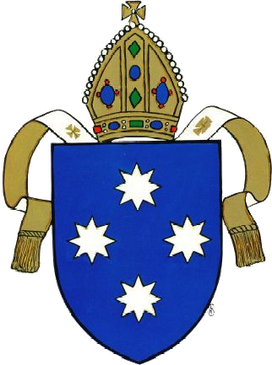
The Diocese of Sydney is a diocese in Sydney, within the Province of New South Wales of the Anglican Church of Australia. The majority of the diocese is evangelical and low church in tradition.

John Robert Walmsley Stott was a British Anglican priest and theologian who was noted as a leader of the worldwide evangelical movement. He was one of the principal authors of the Lausanne Covenant in 1974. In 2005, Time magazine ranked Stott among the 100 most influential people in the world.

James Innell Packer was an English-born Canadian evangelical theologian, cleric and writer in the low-church Anglican and Calvinist traditions. Having been considered as one of the most influential evangelicals in North America, Packer is known for his 1973 best-selling book Knowing God, along with his work as the general editor of the English Standard Version Bible. He was one of the high-profile signers on the 1978 Chicago Statement on Biblical Inerrancy, a member on the advisory board of the Council on Biblical Manhood and Womanhood, and also was involved in the ecumenical book Evangelicals and Catholics Together in 1994. His last teaching position was as the board of governors' Professor of Theology at Regent College in Vancouver, British Columbia, in which he served from 1996 until his retirement in 2016 due to failing eyesight.
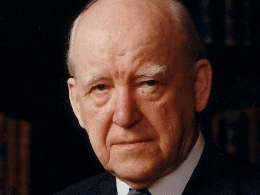
David Martyn Lloyd-Jones was a Welsh Congregationalist minister and medical doctor who was influential in the Calvinist wing of the British evangelical movement in the 20th century. For almost 30 years, he was the minister of Westminster Chapel in London.
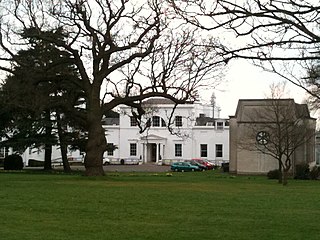
Oak Hill College is a conservative evangelical theological college located on Chase Side in Southgate, London, England. Its aim is to prepare men and women from the Church of England and Independent churches for ministry.
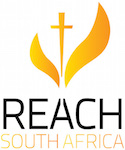
The Reformed Evangelical Anglican Church of South Africa (REACH-SA), known until 2013 as the Church of England in South Africa (CESA), is a Christian denomination in South Africa. It was constituted in 1938 as a federation of churches. It appointed its first bishop in 1955. It is an Anglican church and it relates closely to the Sydney Diocese of the Anglican Church of Australia, to which it is similar in that it sees itself as a bastion of the Reformation and particularly of reformed doctrine.

The Anglican Network in Canada (ANiC) is a group of Anglican churches in Canada and the United States established in 2005 under the jurisdiction of the Anglican Province of the Southern Cone, a province of the Anglican Communion. It was a founding diocese of the Anglican Church in North America in June 2009. It comprises 73 congregations in ten Canadian provinces, Alberta, British Columbia, Saskatchewan, Manitoba, New Brunswick, Newfoundland & Labrador, Nova Scotia, Prince Edward Island, Ontario, Quebec, and one American state, Massachusetts. Their first Moderator Bishop was Don Harvey, from 2009 to 2014, when he was succeeded by Diocesan Bishop Charlie Masters. Bishop Dan Gifford became Diocesan Bishop in 2022.
The Banner of Truth Trust is an Evangelical and Reformed non-profit publishing house, structured as a charitable trust and founded in London in 1957 by Iain Murray, Sidney Norton and Jack Cullum. Its offices are now in Edinburgh, Scotland with a key branch office and distribution point in Carlisle, Pennsylvania. It positions itself within the conservative evangelical wing of the church, and has been described as "an extremely powerful organization within British nonconformist evangelicalism."

The Anglican Church in North America (ACNA) is a Christian denomination in the Anglican tradition in the United States and Canada. It also includes ten congregations in Mexico, two mission churches in Guatemala, and a missionary diocese in Cuba. Headquartered in Ambridge, Pennsylvania, the church reported more than 1,000 congregations and more than 128,000 members in 2023. The first archbishop of the ACNA was Robert Duncan, who was succeeded by Foley Beach in 2014. In June 2024, the College of Bishops elected Steve Wood as the third archbishop of the ACNA. Authority was transferred to him during the closing Eucharist at the ACNA Assembly 2024 conference in Latrobe, Pennsylvania.
The Global Anglican Future Conference (GAFCON) is a series of conferences of conservative Anglican bishops and leaders, the first of which was held in Jerusalem from 22 to 29 June 2008 to address the growing controversy of the divisions in the Anglican Communion, the rise of secularism, as well as concerns with HIV/AIDS and poverty. As a result of the conference, the Jerusalem Declaration was issued and the Global Fellowship of Confessing Anglicans was created. The conference participants also called for the creation of the Anglican Church in North America as an alternative to both the Episcopal Church in the United States and the Anglican Church of Canada, and declared that recognition by the Archbishop of Canterbury is not necessary to Anglican identity.
Conservative evangelicalism is a term used in the United Kingdom to describe a theological movement found within evangelical Protestantism. The term is used more often in this sense, but conservative evangelicals themselves tend to use it interchangeably and synonymously with evangelical. Conservative evangelicals are sometimes called fundamentalists, but they typically reject that label and are keen to maintain their distinct identity, which is more Reformed. Reformed fundamentalism shares many of the characteristics of conservative evangelicalism. In this sense, conservative evangelicalism can be thought of as distinct from liberal evangelicalism, open evangelicalism, and charismatic evangelicalism. Some conservative evangelical groups oppose the ordination of women as ministers or clergy and/or women holding leadership positions.
The Global Fellowship of Confessing Anglicans is a communion of conservative Anglican churches that formed in 2008 in response to ongoing theological disputes in the worldwide Anglican Communion. Conservative Anglicans met in 2008 at the Global Anglican Future Conference, creating the Jerusalem Declaration and establishing the Fellowship of Confessing Anglicans (FCA), which was rebranded as GAFCON in 2017.
Wallace Parke Benn is a bishop of the Church of England. He was the area Bishop of Lewes in the Diocese of Chichester from May 1997 until his retirement in October 2012.

Church Society is a conservative, evangelical Anglican organisation and registered charity formed in 1950 by the merger of the Anglican Church Association and National Church League. In May 2018, Church Society merged with two other evangelical Anglican organisations, Reform and the Fellowship of Word and Spirit to provide a united voice for conservative evangelicals within the Church of England.
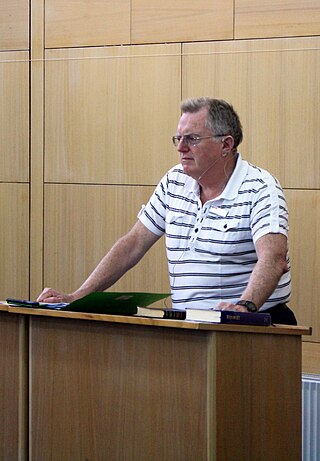
Gerald Lewis Bray is a British theologian, ecclesiastical historian and priest in the Church of England.

Evangelical Anglicanism or Evangelical Episcopalianism is a tradition or church party within Anglicanism that shares affinity with broader evangelicalism. Evangelical Anglicans share with other evangelicals the attributes of "conversionism, activism, biblicism and crucicentrism" identified by historian David Bebbington as central to evangelical identity. The emergence of evangelical churchmanship can be traced back to the First Great Awakening in America and the Evangelical Revival in Britain in the 18th century. In the 20th century, prominent figures have included John Stott and J. I. Packer.

Michael John "Mike" Ovey was a British Anglican clergyman, academic, and former lawyer. From 2007 until his death, he was Principal of Oak Hill College, a conservative evangelical theological college in London, England.

The Anglican Church in Brazil is an evangelical Anglican denomination in Brazil. It is not a member of the Anglican Communion, but is in full communion with other provinces of the Global Fellowship of Confessing Anglicans and the Global South Fellowship of Anglican Churches.
The Anglican Network in Europe (ANiE) is a Christian denomination in the Anglican tradition with churches in Europe. Formed as part of the worldwide Anglican realignment, it is a member jurisdiction of the Global Fellowship of Confessing Anglicans (GAFCON) and is under the primatial oversight of the chairman of the GAFCON Primates Council. ANiE runs in parallel with the Free Church of England (RECUK). GAFCON recognizes ANiE as a "proto-province" operating separately from the Church of England, the Scottish Episcopal Church, the Church in Wales and other Anglican Communion jurisdictions in Great Britain and the European continent. ANiE is the body hierarchically above the preexisting Anglican Mission in England; the former is the equivalent of a province whilst the latter is a convocation, the equivalent of a diocese.
References
- 1 2 3 4 5 "Official website, About". Latimertrust.org. Retrieved 17 November 2014.
- ↑ ThirdWay. Hymns Ancient & Modern. June 1982. p. 5 . Retrieved 17 November 2014– via Internet Archive.
latimer house.
- ↑ "The Times-News - Google News Archive Search" . Retrieved 17 November 2014.
- ↑ "Global Fellowship of Confessing Anglicans - GFCA". Fca.net. Retrieved 17 November 2014.
- ↑ "Studies". Latimertrust.org. Retrieved 17 November 2014.
- ↑ "Briefings". Latimertrust.org. Retrieved 17 November 2014.